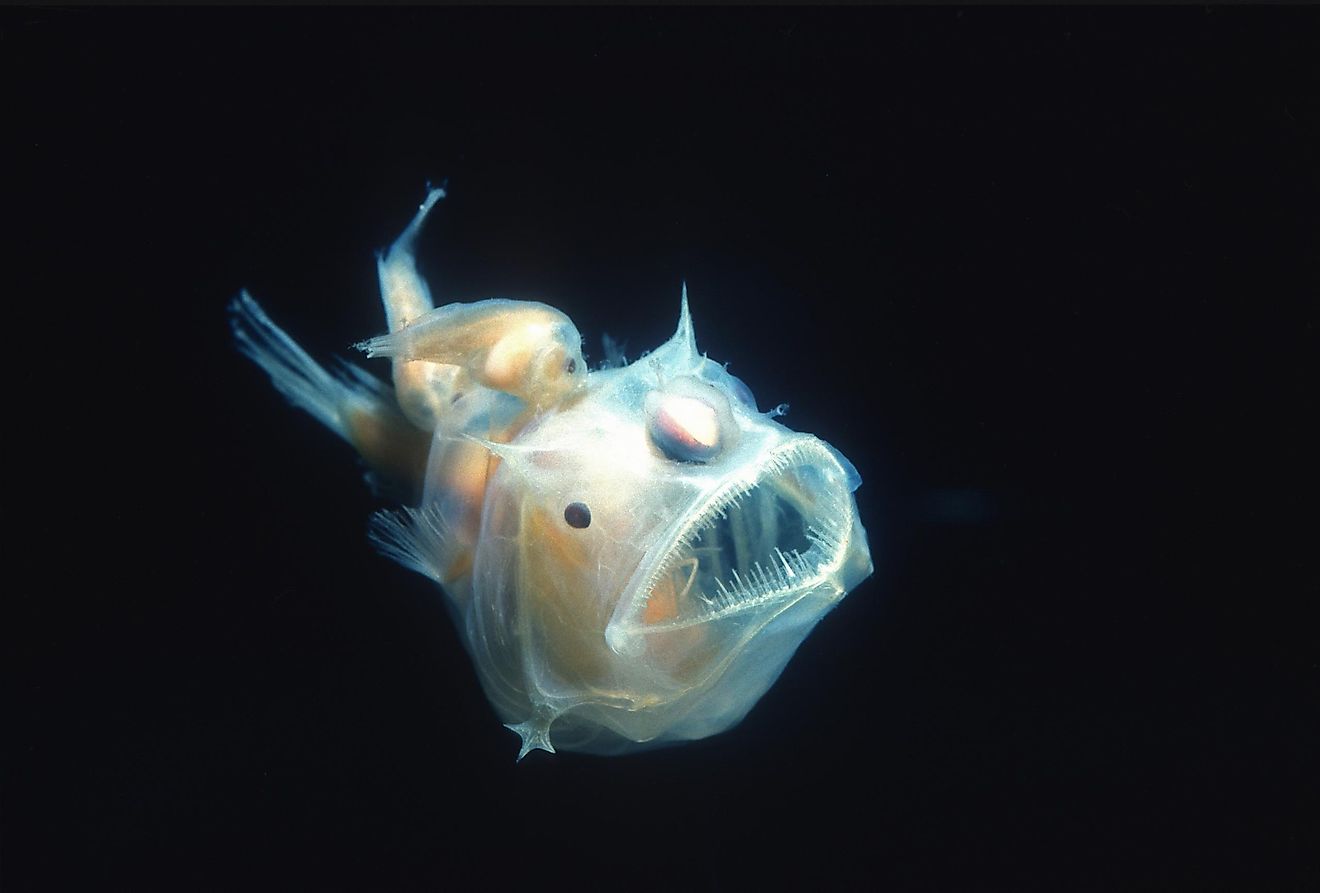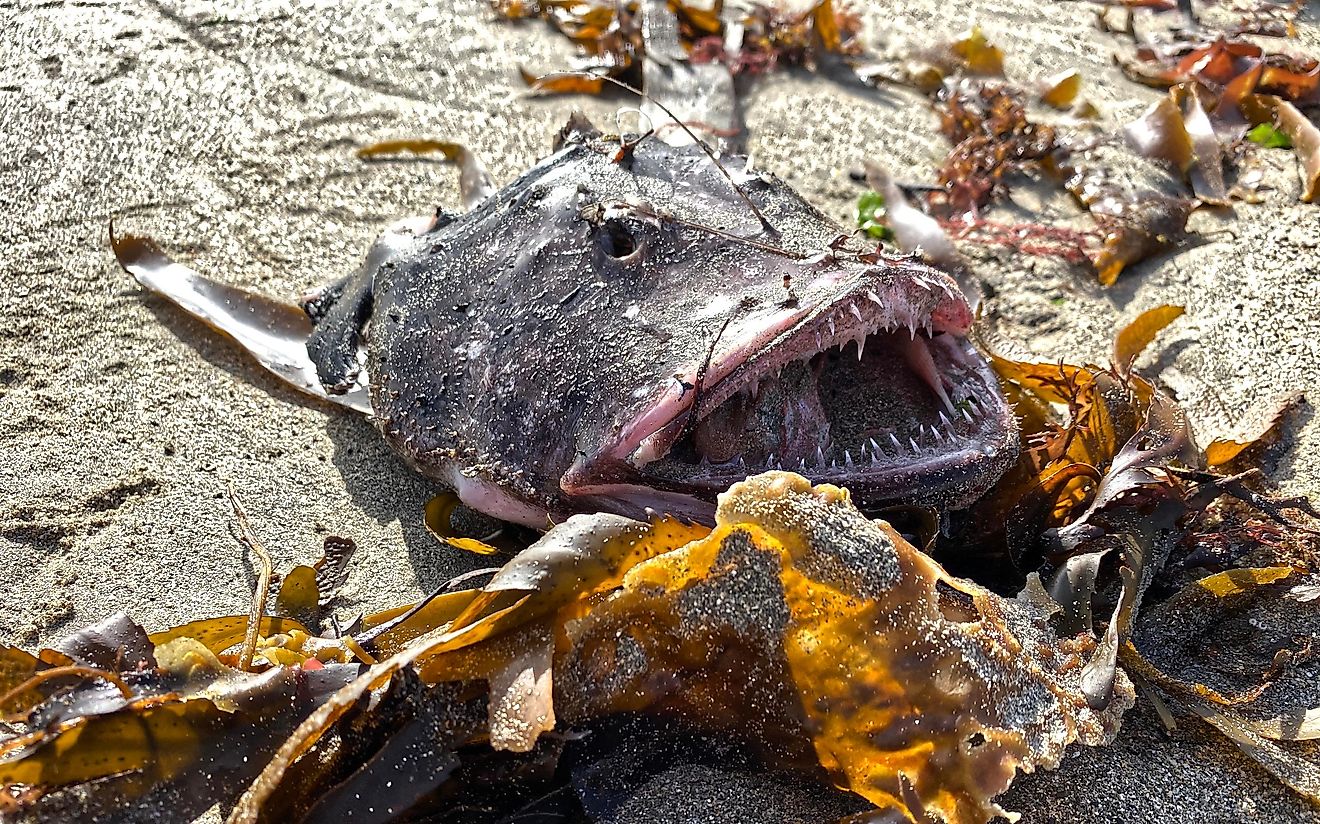Anglerfish: 7 Facts About This Scary Sea Creature

- Only the female anglerfish hunt for prey, the males lead a parasitic life and are used solely for mating.
- They have light glands that they use to bat other fish, and the cause of this light is the bacteria living on the anglerfish.
- The anglerfish can extend its mouth, so it can swallow prey that is twice its size.
One look at an anglerfish, and you want to forget all about it, let alone learn seven interesting facts about it. However, if you are still here, we are going to talk about what many consider to be the ugliest animal on Earth. The anglerfish is a bony fish that got its name because of its specific method of predation. The fleshy growth that comes out of its head has the function of a lure that the anglerfish uses to catch other fish.
These fish can be found all over the world, most of the time dwelling near the seafloor. However, despite popular belief, some swim closer to the surface, so do not be frightened by its looks if you run into one while swimming. The anglerfish has plenty of exciting things about it, and we will delve deeper into several of them in this article.
They Are Close To Being Endangered

During El Niño phases, groups of anglerfish can rise to the surface, which can sometimes result in large groups of them being found floating dead. Certain subspecies of the anglerfish are starting to be recognized by Greenpeace, and added to their red list. This means that they are commonly sold for consumption, but are most likely sourced from unsustainable fisheries.
The meat of the anglerfish is consumed in several parts of the world, most notably in Korea and Japan. However, given its current situation, the anglerfish might become endangered very soon.
They Have A Big Mouth

When we say that the anglerfish have a big mouth, we mean that literally. Their mouth is so wide it extends all over the entire circumference of their head. Both jaws are lined with inwardly inclined small teeth. The teeth of an anglerfish can be depressed, which serves two equally scary purposes.
The first one is that they cannot create any resistance to the food that is gliding towards the stomach of the anglerfish. The second purpose is to prevent the food from escaping its mouth. Yeah, that is incredibly creepy. The anglerfish also have thin and flexible bones, which allows it to extend its jaw and stomach to enormous sizes. Using this ability, it can swallow prey that is twice as large as the body of the anglerfish itself.
They Can Swim Fast If They Want To

The anglerfish can be extremely fast swimmers when they feel like they are in danger; however, they are known to passively drift most of the time. This is possible because the environments they live in are quite harsh, so they need to conserve energy due to the lack of food.
Once they do decide to swim, they can reach speeds of up to 0.24 body lengths per second, which is considered to be notably fast. They are also known to swim sometimes inverted, with their “angler” hanging downwards, which is a method of enticing their prey.
They Have Symbiotic Relationship With Bacteria

Let’s talk more about the light the anglerfish use to hunt for prey, because it is interesting, to say the least. We have previously noted that the source of this light is the bacteria that dwell around the fleshy tip used as bait. This tip is called the esca, and it is believed the bacteria and the anglerfish have developed a symbiotic relationship.
The reason for this is because this bacteria is usually unable to create the luminescence if it is not connected to the anglerfish. They cannot synthesize the chemicals necessary for this luminescence by themselves. These bacteria can only survive in seawater, and the deep-sea habitat of the anglerfish is most suited for their survival. The exact way how the anglerfish finds these bacteria is still unknown.
The Male Fish Are Parasites

The male anglerfish are notably smaller than the females, and they do not use the same bait females do to hunt. They are constantly in a search for females to mate with and have evolved in a sort of a parasitic life partner to them. When a male anglerfish encounters a female, he latches onto her using his sharp teeth. What happens next is quite fascinating.
As time passes, the male starts to fuse with the female physically. He attaches to her skin and bloodstream and begins to lose his eyes and internal organs. Eventually, all that is left of the male is the testes. A female usually carries around six males on her body, although there are cases when it is even more than that.
They Use Bait To Hunt Prey

The feature that anglerfish are most known for is a piece of their dorsal spine they use to catch prey. This is only worn by females, and it sticks out above their mouths, resembling a fishing pole. This is why they are called the anglerfish. The tip of this fleshy growth is luminous, so it serves as a bait to lure the prey.
The glow of this bait comes from the bacteria living in it. After the prey is close enough, the anglerfish can eat it. What is especially impressive is that they can swallow fish that is almost twice their size, since their mouths are so humongous.
Their Body Type Is Determined By Habitat

The anglerfish species have more than 200 subspecies, and the majority of them live in the depths of the Antarctic and Atlantic oceans. They usually stay almost a mile below the surface, but some are known to habituate the more shallow, warmer environments. Believe it or not, the shape of their bodies largely depends on where they can be found.
We describe the anglerfish that live near the surface as being pelagic, while those that dwell close to the seafloor are benthic. The pelagic forms of anglerfish are laterally compressed, meaning they are wider on the sides. On the other hand, the benthic forms are dorsoventrally compressed, meaning their backs and lower parts of their bodies grow longer, and they often have moths that point upwards.











